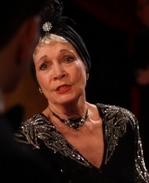SITE GUIDE
SEARCH
REVIEWS
REVIEW ARCHIVES
ADVERTISING AT CURTAINUP
FEATURES
NEWS
Etcetera and
Short Term Listings
LISTINGS
Broadway
Off-Broadway
NYC Restaurants
BOOKS and CDs
OTHER PLACES
Berkshires
London
California
New Jersey
DC
Connecticut
Philadelphia
Elsewhere
QUOTES
TKTS
PLAYWRIGHTS' ALBUMS
LETTERS TO EDITOR
FILM
LINKS
MISCELLANEOUS
Free Updates
Masthead
Writing for Us
A CurtainUp  London Review
London Review
 London Review
London ReviewThe Art of Concealment
|
One needs to be careful about the things one reveals.
— Terence Rattigan |

Judy Buxton as Vera Rattigan taken at Jermyn Street Theatre (Photo: Oscar Blustin) |
Rattigan was homosexual and for most of his life homosexuality was illegal until it was legalised for adult men in 1967. He was also from a generation that had secrets and this is often reflected in his plays with their delicate and moving descriptions of private turmoil and emotional distress. The Art of Concealment opens and closes with Rattigan’s older self (Brian Deacon) in a box at Her Majesty’s Theatre Haymarket in 1977 at the opening performance of his play Cause Célèbre as he looks back on his life.
We meet Terence’s (Ashley Cook) womanising, diplomat father Frank (Graham Pountney) and his mother Vera (Judy Buxton) and hear about his time at Harrow School followed by Trinity College, Oxford and his first play, French Without Tears, produced when he was just 25. Most of the scenes that follow are in Rattigan’s inner circle of friends who are aware of and share his sexual orientation. There is his supporter the critic Cuthbert Worsley (Oliver Hume) and Freddie Gilmour (Graham Pountney), a friend invented for the play but based on an amalgamation of friends from Rattigan’s milieu. There is also a succession of pretty young men that Rattigan fell for, all played by Ewan Goddard.
The first act concentrates on Rattigan’s success, the second on his fading from popularity” and his breakdown. There are attractive speeches about playwriting and how plays present ideas. There is regret that David Lean’s film of Lawrence of Arabia pre-empts and eclipses plans to film Ross, Rattigan’s play about TE Lawrence, another man who sought privacy. There are details sourced from Rattigan’s private writing, a comment on the size and shape of Gielgud’s nose, a phone conversation presumably with Noël Coward and reference to Rattigan’s sponsorship of Joe Orton’s writing.
It is satisfying to know that plays like The Winslow Boy, The Deep Blue Sea, Flare Path, Separate Tables and The Browning Version will endure as examples of Rattigan’s fine playwriting. We also have seen brilliant and successful revivals of Cause Célèbre and After the Dance and hope that these rare Rattigan gems will continue to be mined.
The performances are good, Ashley Cook is appealing and reserved and Oliver Hume has great warmth as a true friend. There is lots of rather affected and self consciously stylish cigarette smoking! Judy Buxton plays both Rattigan’s mother and his fictional audience member “Aunt Edna” who Rattigan says he wrote for.
The set cleverly incorporates all the locations without the necessity to move anything around but I do wish they had got his RAF uniform right. The actor was wearing a Wing Commander’s uniform with full pilot wings and the hat was curiously pinched down instead of being flat. Rattigan was a Flight Lieutenant, an air gunner in Coastal Command, not a pilot.
The success of The Art of Concealment is as a homage to Rattigan’s talent and portrait as a man, who “liked giving presents but . . . not so good at giving affection.” He often gave boys a gold cigarette case and then saw the cases being used having been gifted away to others. The question is, Would Rattigan have been able to write these wonderful plays in an age more tolerant to gay relationships or was his private suffering what produced such wonderful writing?
|
Subscribe to our FREE email updates with a note from editor Elyse Sommer about additions to the website -- with main page hot links to the latest features posted at our numerous locations. To subscribe,
E-mail: esommer@curtainup.comesommer@curtainup.com
put SUBSCRIBE CURTAINUP EMAIL UPDATE in the subject line and your full name and email address in the body of the message -- if you can spare a minute, tell us how you came to CurtainUp and from what part of the country. |
| The Art of Concealment
Written by Giles Cole Directed by Knight Mantell Starring: Brian Deacon, Ashley Cook, Oliver Hume, Graham Pountney, Judy Buxton, Ewan Goddard Set by Meg Witts Lighting: Gary Bowman Sound: Andrew Johnson Incidental music: Mattgray Sound Costumes: Jackie Cryer at Masquerade Running time: One hour 20 minutes with an interval Box Office: 020 8237 1111 Booking to 20th May 2012 Reviewed by Lizzie Loveridge based on 9th May 2012 performance at the Riverside Studios, Studio 3, Crisp Road, London W6 9RL (Tube: Hammersmith) |
|
REVIEW FEEDBACK Highlight one of the responses below and click "copy" or"CTRL+C"
Paste the highlighted text into the subject line (CTRL+ V): Feel free to add detailed comments in the body of the email . . . also the names and emails of any friends to whom you'd like us to forward a copy of this review. |




